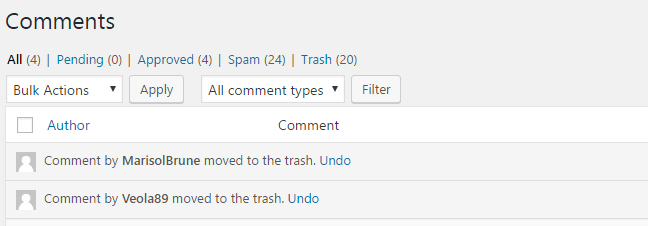
Your blog’s comment section is supposed to be a place where your readers offer feedback, engage with one another, critique your article’s points and offer their own perspectives.
Unfortunately, most comments sections end up being the place where people post all caps URLs for free screen printing, THIS WEEKEND ONLY!!! and snake oil, work-from-home “opportunities.”
When you get a notification of a new comment on your blog, you get excited. Someone’s engaging with my content!
Then you see it’s just another spammy promotional offer with too many exclamation points.
And your heart drops a little bit.
And you wonder: does it have to be like this?
The answer is no.
Let us show you how to defend your comments section from its mortal enemy: spam.
What Makes a Comment Spam?
It’s tempting to approve every single comment that comes through on your WordPress blog, especially if you’re trying to build up your comment sections.
But spammy comments do more harm than good.
Comment spammers are often trying to promote their own sites or work, and often offer links back to their site to build up their link profile.
This is a black hat tactic that Google hates, and if you leave the link on your website, Google will hate you, too.
But how do you actual know whether or not a comment is spam and thus, should be sent to the (virtual) wastebasket?
-
Does the commenter have an actual name? If a spammer is looking to pile your comments section with backlinks to their own website, they might be using a website URL instead of an actual name in the name field.
-
Is the URL related to your industry? A lot of spammy commenters post links to websites that are totally unrelated to the blogger’s industry. If you offer software as a service, and a commenter is promoting and linking to a women’s lingerie company, it’s probably spam, and you shouldn’t approve it. If something looks like a ploy for free advertising, it probably is. Don’t fall for it.
-
Is the comment stuffed with a particular keyword? A lot of spammers who are trying to build their backlink profile will include a link to their website, packed with keywords in the surrounding text.
-
Does the comment add anything to the conversation? “Great article, truly outstanding information, I’m glad that I found this for a bookmark, truly great,” while ostensibly complimentary of your article, adds nothing to the conversation and offers no further insight on your blog topic. If a comment like this is posted by someone whose “name” is just a website URL or if he or she links to their website at the end of the comment, you know it’s spam. And because these comments just clutter your comments section with unhelpful text, it’s best to just delete them.
-
Is the commenter only offering his or her services? Another tell-tale sign of comment spam is someone who is just stumping for their own services. “Great article, very insightful. I was wondering if you might be looking for someone to manage your blog writing. My company has a cutting edge tool for blog production” is spam because it exists to promote a person’s own business or services, and offers nothing to the conversation you’ve started with your article. It’s spam, and you should delete it.
Remember: blogging is supposed to be part of your conversation with your audience and potential customers.
If a comment is not relevant to your article, offers nothing to the conversation, and has no discernible purpose for existing (besides linking to a URL), it’s probably spam.
How Does Comment Spam Hurt Your Website?
Comment spam hurts your website in a number of ways.
First of all, it removes authority from your brand.
When someone lands on your blog, reads through and wants to comment, they are immediately dissuaded by a bunch of spam in your comments section.
Non-moderation of your comments makes you look amateurish, like your blog and site aren’t a huge priority for your brand.
This hurts your authority and readers’ interest in following you in the future.
Secondly, spam comments that link to low-quality sites impact your site’s link profile and your performance in Google.
So not only do spammy comments make you and your brand look bad, they also hurt your website’s performance.
Combatting Spam
If your blog is on WordPress, you’re in luck.
Moderation of your blog’s comments is effortless on this platform. Simply find your “Comments” section on your WordPress dashboard.
And then: moderate.
Use your newly-acquired knowledge of spammy comments to get rid of any spammy comments.
There are also tons of anti-spam plugins that can help you fight the onslaught of spammers every time you publish a blog.
Check out this list of plugins that can help control the amount of spam that ends up in your blog’s comments.
Still have questions about comment spam? Plan Left can help.
Explore Latest Posts
Google says the quality of your webpage is a ranking factor, but what is ‘quality’ according to Google? That would ... read more
April 19, 2024
In 2011, Google first changed how content was written with the Panda Update by changing how keywords could be used ... read more
April 17, 2024
The latest Google algorithm changes have shaken the search marketing world. While the Google Spam update has finished, the Google ... read more
April 16, 2024
MARKETING insights
Join the Thousands Who Receive Our Twice-Monthly Newsletter.
It's hard to keep up. Our newsletter is packed with buyer behavior insights, the latest marketing and technology updates, work/life balance tips, and—because we ❤️ our support staff—adorable pets looking for forever homes. Only twice per month. No clogged inboxes. You can't say no.







